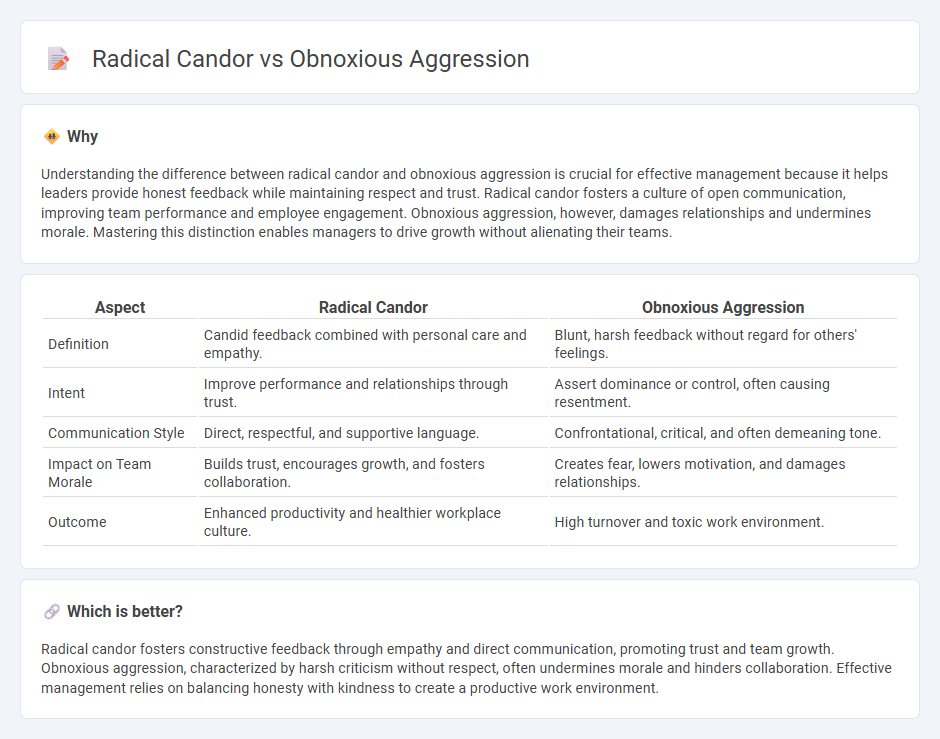
Radical candor emphasizes clear, honest communication combined with genuine care for colleagues, fostering trust and collaboration, while obnoxious aggression involves blunt criticism that disregards others' feelings, often creating a toxic work environment. Effective management balances direct feedback with empathy to improve team performance and morale. Discover strategies to master this balance for successful leadership.
Why it is important
Understanding the difference between radical candor and obnoxious aggression is crucial for effective management because it helps leaders provide honest feedback while maintaining respect and trust. Radical candor fosters a culture of open communication, improving team performance and employee engagement. Obnoxious aggression, however, damages relationships and undermines morale. Mastering this distinction enables managers to drive growth without alienating their teams.
Comparison Table
| Aspect | Radical Candor | Obnoxious Aggression |
|---|---|---|
| Definition | Candid feedback combined with personal care and empathy. | Blunt, harsh feedback without regard for others' feelings. |
| Intent | Improve performance and relationships through trust. | Assert dominance or control, often causing resentment. |
| Communication Style | Direct, respectful, and supportive language. | Confrontational, critical, and often demeaning tone. |
| Impact on Team Morale | Builds trust, encourages growth, and fosters collaboration. | Creates fear, lowers motivation, and damages relationships. |
| Outcome | Enhanced productivity and healthier workplace culture. | High turnover and toxic work environment. |
Which is better?
Radical candor fosters constructive feedback through empathy and direct communication, promoting trust and team growth. Obnoxious aggression, characterized by harsh criticism without respect, often undermines morale and hinders collaboration. Effective management relies on balancing honesty with kindness to create a productive work environment.
Connection
Radical candor and obnoxious aggression both involve direct communication styles but differ significantly in intent and impact on workplace relationships. Radical candor combines care personally with challenging directly, fostering trust and growth, while obnoxious aggression lacks empathy and often damages morale. Understanding these distinctions is crucial for effective management and cultivating a positive organizational culture.
Key Terms
Feedback
Obnoxious aggression in feedback often manifests as blunt criticism that intimidates or alienates recipients, prioritizing the message over empathy and potentially damaging workplace relationships. Radical candor balances honest, direct feedback with genuine care and respect, fostering trust and encouraging growth without causing defensiveness. Explore how mastering radical candor can transform your feedback into a powerful tool for positive change.
Empathy
Obnoxious aggression lacks empathy, emphasizing blunt honesty without regard for others' feelings, often causing resentment or conflict. Radical candor balances directness with genuine care, fostering open communication while maintaining empathetic understanding. Explore the nuances of empathy in leadership approaches to enhance team dynamics and workplace culture.
Directness
Obnoxious aggression prioritizes directness at the expense of empathy, often resulting in hurtful or confrontational communication that damages relationships. Radical candor balances directness with care, promoting honest feedback while maintaining respect and trust within teams. Explore how mastering this balance can enhance workplace communication and leadership effectiveness.
Source and External Links
Radical Candor - The Manager's Handbook - Obnoxious aggression occurs when you criticize someone directly without showing you care about them personally, often making feedback feel harsh, embarrassing, or undermining, and is driven by fear rather than genuine concern.
An Obnoxious Aggression Story | Aaron Dimmock - YouTube - Obnoxious aggression, sometimes called brutal honesty or front stabbing, means challenging someone directly without demonstrating personal care, which can damage relationships even if your intent is to be straightforward.
Obnoxious Aggression - Bearz Repeating - Magic Judge News - While obnoxious aggression is not ideal, Kim Scott suggests it's better than avoiding tough conversations altogether, but emphasizes that true leadership is about challenging directly while also caring personally.
 dowidth.com
dowidth.com